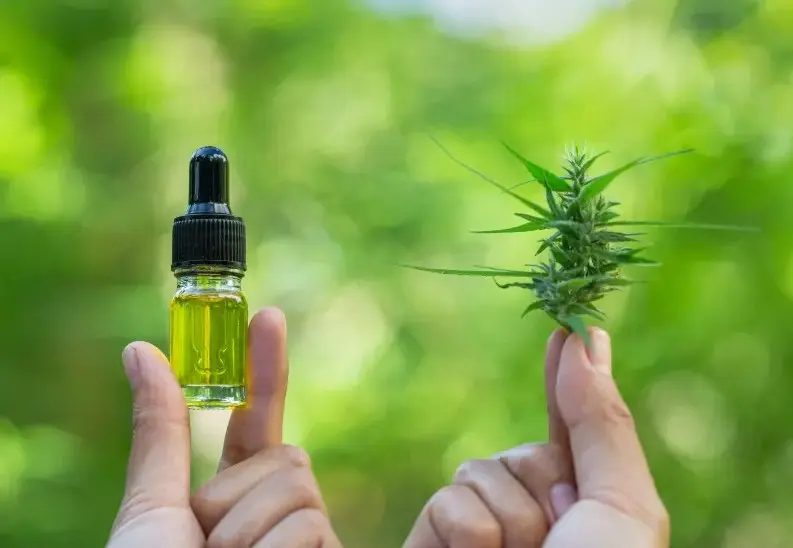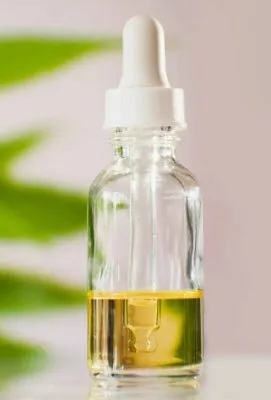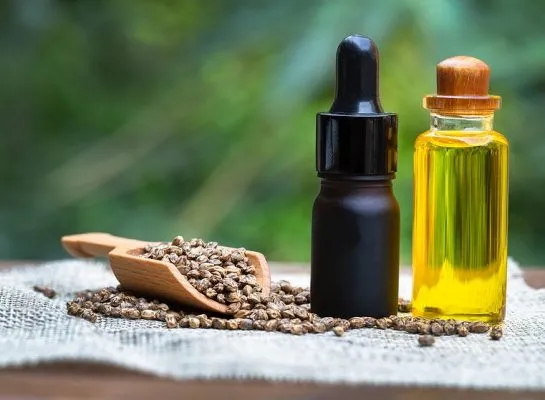It’s not easy to live with constant discomfort. Whether you have muscular spasms, chronic pain, arthritis, or regular everyday soreness, finding a way to cope with your pain may make a significant difference.
Over the last several years, CBD oil has grown in popularity as a pain management technique. While CBD has yet to be approved by the FDA for the treatment of pain, more physicians and scientific researchers are taking a closer look at its potential.
The major difference between CBD oil and traditional cannabis is that it does not produce an intoxicating “high.” CBD is readily accessible in the United States and dozens of other countries due to the 2018 U.S. Farm Bill’s reform of hemp legislation.
However, there are so many CBD manufacturers to select from that how do you discover the greatest CBD oil for pain?
In this post, we discuss the realistic medical potential of CBD oil in terms of reducing pain symptoms. We also detail our choices for the top ten CBD products on the market, based on quality, efficacy, customer service, and price. Finally, we’ll go through what you should think about while selecting a CBD company. Let’s get started!
CBD Oil for Pain Relief
We’ve learned through numerous research that marijuana (i.e., medical cannabis) is sometimes used instead of prescription pain relievers. Marijuana’s intoxicating effects, however, make it undesirable for many consumers.
Cannabidiol (CBD), a non-intoxicating component of cannabis, is also used to treat a variety of ailments, including pain relief. We noticed that some of the finest CBD oils might help with pain management.
However, it’s essential to note that CBD oil isn’t approved by the FDA for pain relief. This implies that the items and claims made in this piece are without regulatory approval. As a result, we must emphasize that CBD is not meant to be used as a diagnosis, therapy, cure, or preventative measure for any medical problem.
However, CBD has received significant press attention even though the FDA has not yet approved it. You’ve undoubtedly seen CBD stories on top news networks or heard about it being recommended by prominent social persons for a variety of pain alleviative purposes.
Charlotte’s Web, a firm known as “the world’s leading CBD brand by market share” by Yahoo Finance, has been featured on sites including CNN and The Wall Street Journal, as well as in popular fitness publications such as Men’s Health.
So, is there any proof that CBD oil can aid pain or is it all hype with little substance or evidence?
How Effective Is CBD Oil for Pain?
A growing number of individuals use CBD to address pain. Users claim that the cannabinoid relaxes their muscles and eases their dependence on pain medications, giving them significant pain relief.
The endocannabinoid system (ECS), a cell-signaling mechanism in the body, regulates our health. CBD has been linked to ECS receptors in the immune system, according to researchers. These receptors activate when chemical messengers are delivered and ensure that cells respond to events. The anti-inflammatory effect helps decrease discomfort and edema (swelling).
What Do the Studies Say?
The number of CBD studies on pain is increasing at a rapid pace. Transdermal CBD was studied in rats with induced arthritis by the European Journal of Pain researchers. The scientists applied CBD gels to the rats’ painful paw joints in four different dosages (0.6, 3.1, 6.2, and 62.3mg) per day for four consecutive days.
The researchers discovered that CBD gel reduced joint swelling significantly. Surprisingly, the 62.3mg dose was no more effective than the 6.2mg dose.
Meanwhile, in 2018, researchers conducted a study in Frontiers in Immunology that investigated the anti-inflammatory effects of CBD on mice. After administering the cannabinoid for ten days, the researchers observed a decrease in inflammatory chemicals. They utilized a mouse encephalitis model that reflects the effects of multiple sclerosis on the body.
Cannabidiol, according to scientific evidence, may make pain feel less unpleasant, although it does not reduce experimental pain intensity.
CBD has been shown in two independent studies to have pain-relieving properties, according to a research conducted at Syracuse University in 2021. It’s significant news because it was the first study of its kind to examine CBD’s impact on people. Cannabidiol reduced experimental pain intensity, but not painfulness, according to the findings.
CBD led to improved pain severity, as compared to a placebo, according to the researchers. This is hopefully only the beginning, and it will lead to CBD’s acceptance as a painkiller option.
Using CBD Oil for Pain
Typically, the advice for using CBD oil involves placing it beneath your tongue and holding it for up to 60 seconds before swallowing. This process ensures that some of the CBD gets into your system sublingually.
When it comes to CBD oil for pain, however, many individuals prefer to apply it directly to the painful area. It’s possible that a topical infused with cannabidiol absorbs more readily than oil. Many people who massage CBD into their skin notice an appreciable difference in time.
Only apply CBD to a small area of skin if you’re new to it. You must avoid any unwanted symptoms. Gradually increase the amount used until you reach the “minimum therapeutic dose.” This is a phrase that refers to when you utilize the smallest quantity feasible to achieve the intended effect.
Best CBD Oil for Pain: Side Effects
Although CBD has a favorable safety profile according to the World Health Organization (WHO), there are some negative consequences. When compared to the severe negative effects of prescription opioids and other pain medicines, these side effects are mostly minor.
The most comprehensive source of information on CBD side effects is the clinical trials of Epidiolex (a FDA-approved cannabidiol therapy used to treat rare forms of epilepsy). Cannabidiol users may experience the following effects:
- Somnolence
- Decreased appetite
- Diarrhea
- Transaminase elevations
- Fatigue, malaise, and asthenia
- Rash
- Insomnia, sleep disorder, and poor-quality sleep
- Infections
CBD may also have an impact on liver health, although this is yet to be studied. CBD is also known to interact with enzyme mechanisms and drug metabolism. As a result, it’s critical to discuss CBD for pain alongside other medicines with your doctor.
Let’s take a look at the most prominent producers and their product lines now that you’re more acquainted with CBD oil for pain!
PureKana Natural CBD Oil
PureKana is a unique company that has assisted thousands of people in the United States with CBD oil drops. It has been featured in numerous major media outlets, including Forbes and High Times, and is frequently recognized as one of the best CBD oil brands.
PureKana is one of the newest companies to enter the CBD market. It uses a proprietary CO2 extraction technique, resulting in an almost pure CBD oil. PureKana Natural CBD Oil is a flavorless, dietary and nutritional supplement for enhanced health and vitality.
It may assist in the management of chronic pain, rehabilitation from exercise-induced inflammation, reduction of edema, support perimenopausal and postmenopausal women’s health, help manage typical daily stresses, and improve sleep patterns.
Premium Jane CBD Oil
Premium Jane’s 1,000 mg full-spectrum oral tincture was compared to other CBD oils on the market by one of our team members. He said it was very effective in treating his chronic back pain, with the effects lasting longer than those from other companies.
Fab CBD Premium Oil Drops
The company’s name, FAB CBD, has been developed to reflect its forward-thinking approach. Everything from the website’s appearance to the branding to the language used by the organization screams trendy and cool.
Despite the fact that FAB CBD is still ranked beneath our main PureKana, it has shown to be a trustworthy company and a high-quality product. All of its CBD products are produced from organically cultivated Colorado hemp that has been extracted with pressurized CO2 technology. This is an indication that it has made no effort to cut corners in producing a top-notch oil.
In terms of price, its oils are comparable to many of the competition, and it now has a CBD oil with a potency of 2400 mg.
CBDPure
CBDPure hasn’t received the same celebrity endorsement as PureKana or Premium Jane. CBDPure, on the other hand, produces one of the best CBD oils available.
Furthermore, the company uses third-party lab testing to guarantee that each batch has precise cannabinoid profiling. All of its items are free of any dangerous bacteria or viruses that may have contaminated the raw hemp material. The major drawbacks are a lack of product choice and a maximum CBD oil concentration of 1000mg. Even so, the high quality makes up for it.
Choosing the Best CBD for Pain: 6 Things to Consider
The lack of regulation is one of the most significant issues facing the CBD industry. It has long been referred to as the “Wild West” in terms of regulatory standards. Epidiolex, a pharmaceutical drug containing CBD, has been authorized by the FDA for a variety of indications. Industrial hemp that contains no more than 0.3 percent THC dry weight per plant is also permitted to be grown legally with a license.
CBD, on the other hand, has not been authorized by the FDA as a pain medication. While several states, such as Florida, have created legislation regarding the CBD business, many locations have no rules whatsoever.
As a result, anyone with a little knowledge and equipment can produce CBD goods without much government regulation. As a consequence, there has been an increase in the number of low-quality, ineffective, and even hazardous CBD products on the market.
Mislabeling and contaminants have been identified in numerous published research. One of the most recent papers, published in Missouri Medicine in 2020, discovered that the FDA reviewed 102 goods that claimed a particular CBD content. Of the 18 with less than 80% of the amount advertised on the product label, 18 had under 80%. Another 38 had more than 120% of what was stated on the label, while roughly half of them contained measurable amounts of THC.
As a result, consumers need to know exactly what they’re purchasing. We recommend trying one of the CBD products we’ve reviewed above. However, if you want to do more study, here are some ideas for buying cannabidiol securely.
Hemp Source
Where a brand gets its hemp from is the first step. Avoid any firm that doesn’t source its hemp from a legal farm in the United States or the European Union in simple terms. Kentucky and Colorado have earned a reputation for producing among the greatest hemp in the world.
Extraction Method
Avoid any firm that utilizes butane extraction, since its goods might include hazardous residual solvents. Some well-known companies use food-grade ethanol extraction and claim that it ensures a greater quantity of terpenes and cannabinoids in the final product.
Ethanol is a Class 3 solvent, according to the FDA, which means it is less hazardous than Class 1 and 2 solvents. However, the agency states that 5,000ppm of ethanol is “without basis.” Nonetheless, some CBD users avoid using any solvents.
The less oil that remains at the bottom, the better. The best way to do this is with supercritical CO2 extraction. It is regarded as the gold standard of extractions since it eliminates all residual solvents. As a result,
Third-Party Lab Reports
A brand must submit its CBD products for third-party testing and provide COA certificates of analysis (COA) on its official website.
A COA tells you whether the marijuana contains cannabidiol and, if so, at what concentration. It provides assurance that the THC level is low and that residual solvents, pesticides, and other poisons are absent.
Make sure that the COAs are up to date and that the testing was conducted by a reliable laboratory not affiliated with the brand.
Ingredients
Aside from learning where the hemp was grown, pay attention to the product’s label. Is there a detailed list of ingredients on the bottle? Are there far too many “add-ons” in the CBD oil? We prefer CBD oils that contain just hemp extract, a carrier oil like MCT oil, and maybe some natural flavorings.
Type of CBD
The most popular strain of cannabis is, without a doubt, THC. THC is the chemical in marijuana that makes you feel high. There are different types of strains and each has its own set of effects. However, CBD users can vouch for certain cannabinoids because they provide more benefits than any single cannabinoid alone could. The entourage effect refers to the idea that hemp’s components work better together than apart.
There are three types of CBD oil: broad-spectrum, which contains almost all of the cannabinoids present in a full-spectrum product, minus THC; limited-spectrum (LS), which has less than 0.3 percent THC and is derived from hemp that has been cultivated to contain less than 0.3 percent THC; and high-CBD isolate, contained entirely of cannabidiol with no other cannabinoids added during the first extraction process. Terpenes may be added after the initial extraction procedure by some brands.
Brand Reputation
Finally, keep an eye on a firm’s reputation. It appears as if there are a new CBD vendor every day. You should buy from a company with many years of experience if at all possible. Look up consumer feedback and pay attention to the quality of customer service.
Final Thoughts
This post has a lot of useful information for people considering CBD as an adjunctive or alternative treatment for pain and/or anxiety. CBD works in the body by changing receptors throughout organ tissues, the immune system, the pain response system, the hormonal system, and other systemic regulatory systems.
CBD oils have not been evaluated or authorized by the FDA to treat these conditions. CBD’s safety and efficacy, however, are well-documented (both anecdotal and research-based). The potential new user must be aware of a number of critical factors, as outlined in this article.
Not all goods are created equal—they differ significantly in potency, absorption, and excretion by the body.
To begin, only items produced from industrial hemp will be legal in most states. If you’re buying a product that’s been derived from the marijuana plant, keep an eye out for THC levels greater than the permitted limit in your state.
Furthermore, all things are not equal; they vary significantly in terms of strength, absorption, and excretion by the human body. It’s critical to comprehend the variations in dosages available for each product, beginning with a little or low dose and gradually increasing as necessary to achieve pain relief.



